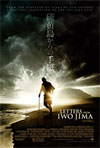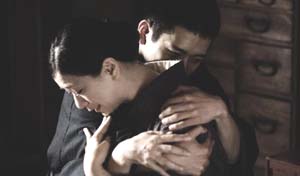
Amazing Grace
Babel
Charlotte's Web
Dream Girls
Into Great Silence
Last King of Scotland
Letters from Iwo Jima
The Namesake
Notes on a Scandal
See
2006 films
My admiration for the work of Clint Eastwood continues to grow. He is such a great example of an artist, well into his 70’s, who continues to deepen his breadth of vision, and grapple with substantive issues of our day. His latest work, Letters from Iwo Jima, is stunning in its simplicity and poignancy. It would have been a great film had Eastwood directed it in his native language. The fact that he directs it in Japanese is even more amazing. Letters is a companion piece to Flags of Our Fathers (which I have not seen). While Flags tells the story of the horrific battle and its aftermath from the American side, Letters tells the story from the Japanese side. It’s unimaginable that a film like this could have been made even 25 years ago. Eastwood dares to suggest that the Japanese soldiers were human beings too, like the American soldiers in many ways. They struggled with their feelings for their families back home, duty to country, honor, and courage under fire. Letters does not suggest that every Japanese soldier is faultless (nor every American for that matter). But he does suggest that the vast majority of the Japanese stationed on that tiny island were brave and honorable men, similar to our own.
Eastwood has some great collaborators in this project: Co-Producer Steven Spielberg, who gave us Saving Private Ryan and Schindler’s List, and Paul Haggis, who wrote the screenplay for Million Dollar Baby and directed last year’s Oscar winner, Crash. Haggis co-wrote the story, Letters from Iwo Jima with Japanese-American Iris Yamashita. These collaborators bring together a sense of common humanity across cultures amidst the global tragedy of World War II. Certainly Letters is a violent movie. Yes, there were times when I looked away from the screen. However, I credit Eastwood with exercising restraint. He’s not out to “gross out” the audience by showing lots of gore. What I remember most are the quiet scenes: Japanese soldiers talking to a captured American, then, after his death, reading a letter from his mother. One of the Japanese remarks, “It’s sounds just like the kind of letter my Mother would have written.” In another memorable moment, a Japanese soldier who is a former Olympic equestrian, sobs over the death of his horse. All of this is photographed on a monochromatic palate: a dull somber green. The only bright colors are the exploding bombs that light up the sky. “Love your enemies; pray for those who hate you.” It’s amazing to me that Clint Eastwood, who made several films as the macho Dirty Harry, now can show us the way to loving our enemies. With a seemingly endless war in Iraq raging on, and casualty numbers reported daily in the media, Eastwood’s film is a somber reflection on the common humanity we all share, even on opposite sides during a terrible battle. Letters from Iwo Jima is a great reflection during our own time of war. It’s hard to imagine supporting an escalation of war after seeing this haunting film. Tom Condon, OP |
Eastwood dares to suggest that the Japanese soldiers were human beings too, like the American soldiers in many ways. |
 Home | Contact Us | DLC Dominican Life | USA is sponsored by the Dominican Leadership Conference, the networking organization for elected leaders in the USA. Dominican Life | USA © 2002-2007, All Rights Reserved Web Editor: Anne Lythgoe, OP |
|---|



 Among the many characters we meet in Letters, two stand
out: the humane General Kuribayashi (played by the excellent
Japanese actor Ken Watanabe) and a Saigo, a young, innocent baker,
who longs for his beloved, pregnant wife at home. Saigo
is a familiar character is war stories: young, naïve,
and terrified. Saigo wants to be strong and brave, and
serve his country. Above all, his goal is to survive so
he can return home to his wife and the child he has never seen. Kuribayashi
fondly remembers the time he spent in the United States representing
Japan before the war. He admires Americans and has no desire
to kill them. Still, as a good soldier, he is loyal to
his own country, and desires victory. On more than one
occasion, Kuribayashi and Saigo cross paths, and form a bond
between the experienced general and the frightened recruit.
Among the many characters we meet in Letters, two stand
out: the humane General Kuribayashi (played by the excellent
Japanese actor Ken Watanabe) and a Saigo, a young, innocent baker,
who longs for his beloved, pregnant wife at home. Saigo
is a familiar character is war stories: young, naïve,
and terrified. Saigo wants to be strong and brave, and
serve his country. Above all, his goal is to survive so
he can return home to his wife and the child he has never seen. Kuribayashi
fondly remembers the time he spent in the United States representing
Japan before the war. He admires Americans and has no desire
to kill them. Still, as a good soldier, he is loyal to
his own country, and desires victory. On more than one
occasion, Kuribayashi and Saigo cross paths, and form a bond
between the experienced general and the frightened recruit.